
Tim Loughton MP attended a Guide Dogs event at the House of Commons on 3 July to show their support for the campaign to end problem pavement parking.
At the event, the MP for East Worthing and Shoreham heard from guide dog owners how parked cars blocking the pavement force them to walk in the road, into the path of traffic they cannot see. They heard that some guide dog owners face these dangerous situations on a daily basis, risking their safety every time they go shopping or make the school run.
Research by YouGov for the charity Guide Dogs shows that 54% of UK drivers admit to parking on the pavement, with more than a quarter (29%) of those doing so a few times a month or more. More than half (55%) of these drivers do think about the impact on people with sight loss, but park on the pavement anyway.
Pavement parking particularly affects people with visual impairments, parents with pushchairs, wheelchair users and other disabled people. According to a Guide Dogs survey, 97% of blind and partially sighted people have encountered obstacles on the pavement, and 9 out of 10 have had problems with pavement parked cars.
Guide Dogs is campaigning for to make pavement parking an offence, except in areas where local authorities grant specific exemptions. This is already the case in London, but elsewhere across the country, councils struggle to tackle unsafe pavement parking because they can only restrict it street by street.
Tim Loughton MP commented:
“No one should be forced to brave traffic by cars parked on the pavement. I’m calling on the Government to end problem pavement parking across the country. Blind and partially sighted people should be able to walk the streets without fear.”
James White, Senior Campaigns Manager at Guide Dogs, commented:
“Pavement parked cars can turn the walk to work or trip to the shops into a dangerous obstacle course. It’s a nuisance for anyone, but if you have a visual impairment or a toddler in tow, stepping out into the road with moving traffic is just too big a risk.
Our research shows that most drivers who park on the pavement know that it can be dangerous for pedestrians, but many do so regardless. That’s why we need clear rules so that drivers only park where it’s safe.
Back in 2015, we were encouraged when the Government committed to find a solution to this problem. We hope that they will now follow up with a law to curb unsafe pavement parking.”
